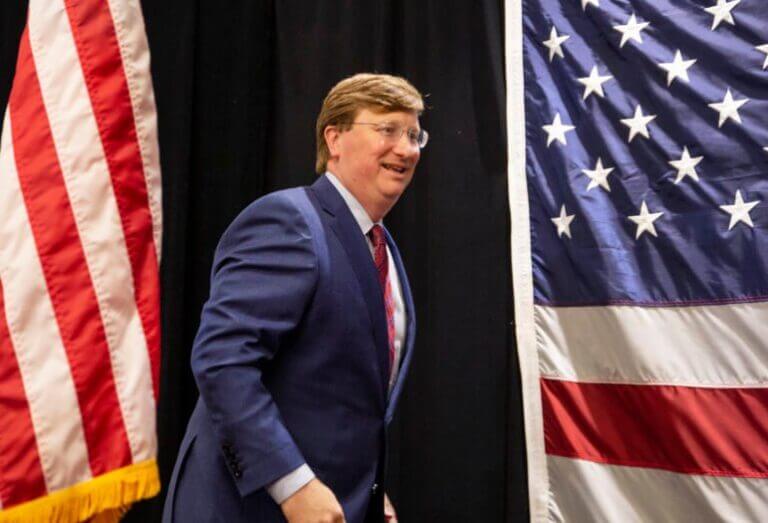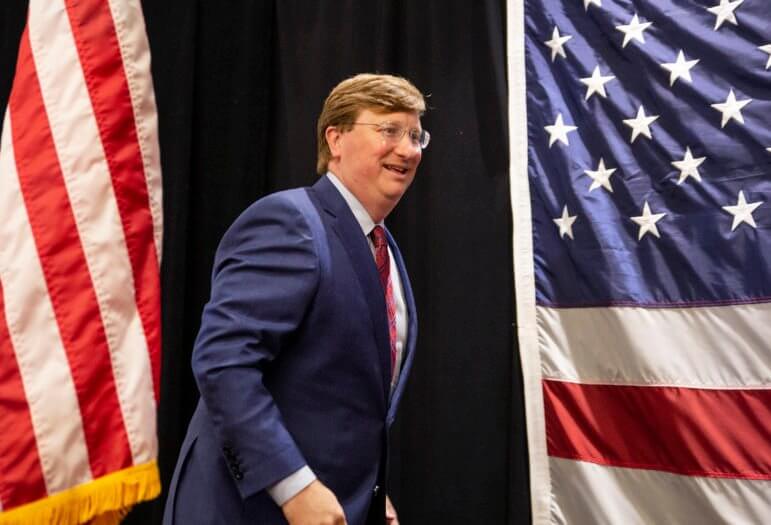

Eric J. Shelton/Mississippi Today, Report For America
The Mississippi Supreme Court upheld Gov. Tate Reeves’ partial veto of legislation earlier this year providing funds to multiple entities to combat COVID-19.
In a ruling that weakens legislative powers, the Mississippi Supreme Court upheld Gov. Tate Reeves’ partial veto of legislation earlier this year providing funds to multiple entities to combat COVID-19.
“The governor is obviously very pleased that the court interpreted the Constitution the way it was written,” Reeves’ spokesperson Bailey Martin said of the ruling in the lawsuit that pitted the Republican leadership of the House against the Republican governor. “This will be an impactful decision — protecting taxpayer dollars — for a long, long time.”
Six of the nine justices, with Chief Justice Michael Randolph writing the majority opinion, on Thursday reversed an earlier Supreme Court ruling that gave individual legislators the authority to file lawsuits challenging the constitutionality of partial vetoes. The justices went on to say that Reeves’ partial veto that he issued earlier this year was proper.
Justice James Maxwell said he saw no need to rule directly on whether the legislators had standing to bring the lawsuit because a majority decision was reached that the partial veto was proper.
Justice Josiah Coleman, on the other hand, opted not to rule on whether the partial veto was proper, arguing instead that the case was improperly before the state’s highest court because the legislators did not have standing to bring it.
House Speaker Philip Gunn and House Pro Tem Jason White filed the lawsuit after the Legislature passed a bill this summer appropriating federal funds designed to fight the coronavirus to four different state agencies, including $91.9 million to the Department of Health. The Department of Health funds were slated to be disbursed to various health care providers.
Reeves vetoed $2 million designed to go to the shuttered North Oak Regional Medical Center in Tate County if it reopened, and $6 million to a program designed to combat health care disparities in poor and minority communities.
Since the funds had to be spent this calendar year, it is not clear whether the money could have been useful even if the Supreme Court had overturned the partial vetoes at this late date.
“We strongly believed the law supported our position when we filed this lawsuit,” Gunn said in a statement. “Our objective was to protect the rights of citizens to have their voice heard through their elected representatives and to guard against an abuse of power by one man. Today’s ruling weakened the rights and the voice of the citizens and vested more power into the executive branch. It is unfortunate.”
Justice Leslie King, a former member of the House, was joined by Justice James Kitchens in contending that Reeves’ partial veto was not proper and that the court majority also was wrong to find that Gunn and White did not have standing.
Perhaps the most striking portion of the ruling was the decision of a majority of the court that individual legislators could not bring such a lawsuit. In a case in the early 1990s, the Supreme Court had ruled that individual legislators did have standing to file similar lawsuits.
While the Constitution gives the governor partial veto authority, Supreme Court rulings through the years have dramatically limited that authority. The Supreme Court has previously ruled that the governor could not use that authority to veto so-called “purposes or conditions.”
King argued that for Reeves’ 2020 veto to have been proper, the governor would have had to veto the entire section of the bill sending money to the Department of Health, and that the money for the two vetoed items was a “purpose or condition” of the money appropriated to the Department of Health.
The majority indicated that the unique nature of the bill — that it appropriated funds to different agencies — might have played a role in the finding that the partial veto was proper.
“The omnibus characteristics of House Bill 1782 dictate today’s results,” Randolph wrote. “… The removal (or veto) of these appropriations did not affect any other appropriations in the bill.”
Quoting a case from the 1890s finding a partial veto improper, Randolph wrote, “the (Reeves) partial veto properly removed parts that could be ‘taken from the bill without affecting the others.’”
During oral arguments on the case heard last month, some of the justices argued that this case was different than other partial veto rulings because the Legislature was in session when it occurred while it was not in the other cases. In fact, the Legislature was in session in at least one of the past cases. But the issue of whether the Legislature was in session did not appear to play a role in the ruling.
And the case was heard soon after the Nov. 3 general election where Reeves voiced strong support for the re-election of Justice Coleman to his Northern District seat and contributed to his campaign. Coleman participated in the case, not ruling on the merits, but contending Gunn and White did not have standing to bring such a case.
The post Supreme Court sides with Gov. Tate Reeves in partial veto fight with speaker appeared first on Mississippi Today.
- Ole Miss QB Trinidad Chambliss gets another year of eligibility, under judge’s ruling - February 12, 2026
- Mississippi House passes bill to force local governments and law enforcementto cooperate with ICE - February 12, 2026
- Mississippi Senate pushes to let rural hospitals offer new services - February 12, 2026